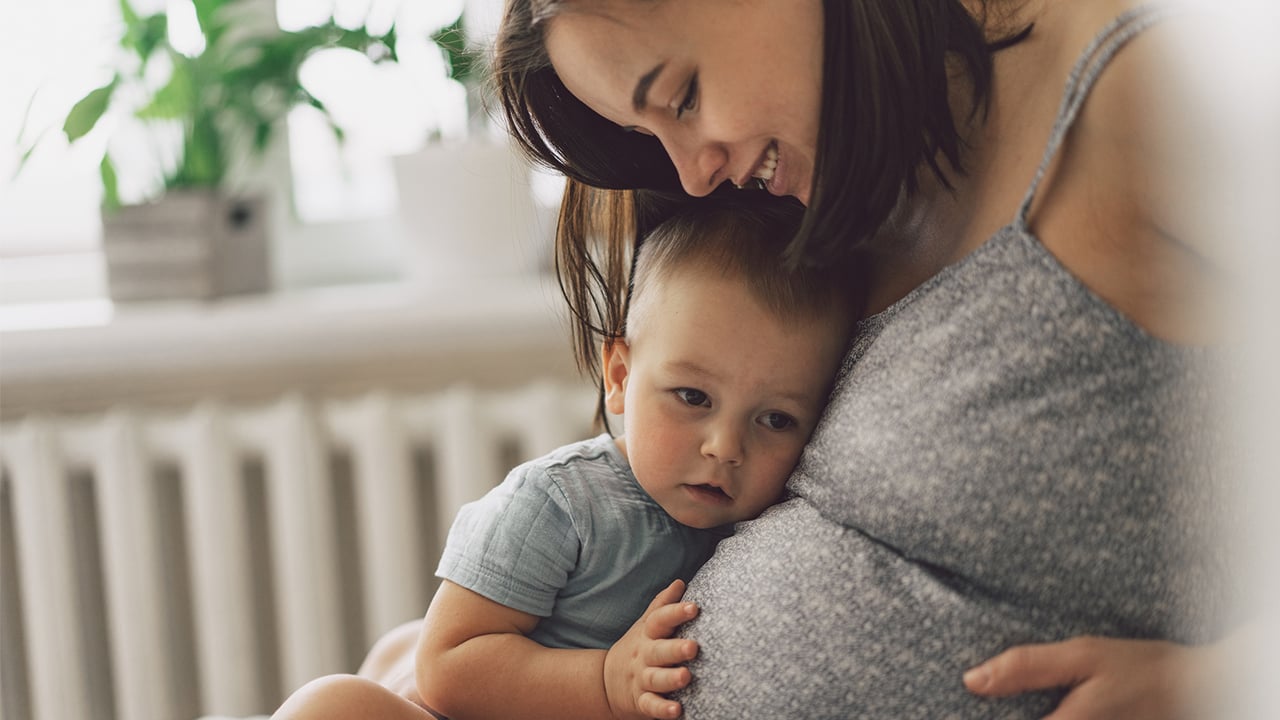My sister has always been a planner. After giving birth to her first son, she timed things precisely so there’d be a three-year age gap between him and her second baby. Then she did it again between her second and third. She liked the idea of her kids being close enough in age to relate to one another, yet not so close that they’d compete for their parents’ attention.
She got lucky: Her her body and life circumstances co-operated, and her plan worked out exactly as she’d hoped. But it wasn’t all plain sailing: Ultimately that three-year formula didn’t just help my nephews have a tighter bond, it was necessary for her not to rush into getting pregnant again. My sister needed that time to recover from all-day “morning” sickness; a C-section for her breech middle child; and a pelvic injury from carrying and delivering his 11.3-pound little brother, which immobilized her for weeks and took several more months to heal.
Planning for a second baby can be a complex equation, with hopes, dreams, health and pragmatism all in the mix. Here are some of the big questions to ponder, before trying to get pregnant again:
What’s the best age gap between kids for sibling bonding?
My sister’s three-year formula seemed to work: My nephews are grown up now and they’ve been there for each other through everything from schoolyard drama to surgeries to broken hearts. But we all know siblings with significantly smaller or larger age gaps than my nephews, who nonetheless formed unbreakable bonds. And we also know close-in-age sibs who can’t stand each other.
Your own childhood experiences will likely factor into your decision. “My brother and I were six years apart and that felt like a large gap growing up,” says Morgan Charles, a mother of two in Toronto. “So, we started trying for a second when our first was coming up for two years old; I wanted them to be relatively close in age, because I didn’t have that.”
Or you might decide it’s time, because your firstborn is begging for a baby sister or brother. That’s what happened to another mother of two, Ni No Wong, who lives on Fogo Island, in Newfoundland and Labrador: “I put off having another baby, because I was enjoying my time with the first so much I didn’t want another child to dilute the love, attention, time and money. Also I was working full time, so I couldn’t imagine myself with two toddlers in the house,” she said.
Her mind changed when her daughter started asking for a sibling at around the age of four–and when friends who grew up as an only child told Wong they had felt very lonely at times. Wong started trying again, and says it was a great decision for everyone. “My eldest daughter is five years and three months older than my youngest. They still fought like crazy when they were little, but they are very close sisters now.”
Really there is no magic age-gap that works for all families. In planning for baby two, it is important to go with what feels right and fits our individual circumstances. Ann Douglas, author of Happy Parents, Happy Kids and the The Mother of All Books series, says you should ask yourself if you’ll be able to parent in a way you can feel good about, if you add another baby to the mix nine or so months from now. “If your goal is a healthy sibling relationship,” she adds, “you want to make sure there’s enough of you to go around—that you have the capacity to meet the needs of both of your children.”
How soon can you get pregnant after giving birth—and is it even possible if you’re nursing?
If you are not lactating, you will start ovulating again between about six weeks and three months after giving birth. If you are nursing exclusively, you may not begin ovulating again until six months later—or even beyond that, says Roberta Mackenzie, an OB-GYN in Toronto.
But even if you haven’t had your period since giving birth, that doesn’t mean you can’t get pregnant, says Mackenzie. That’s because many women actually ovulate before their first period. “If you’re nursing, at least every four hours, and not giving any supplementation, then the chance of ovulation is pretty low. But as soon as formula or solids are introduced, or if you’re only nursing at nighttime or just a few times during the day, it’s possible you’ve already started to ovulate and your period is about to come back.”
The main takeaways: If you’re planning to have sex, but you’re not planning to get pregnant, use birth control! But if you do want to get pregnant quickly, you need to be aware it could be much harder to conceive if you continue nursing long term and frequently. “Sometimes you do have to make a choice there, because your ovulation is likely being pushed back,” Mackenzie says.
What are the risks of getting pregnant too quickly?
The World Health Organization recommends waiting 18 to 24 months between giving birth and getting pregnant again, to reduce the risk of stillbirths, lower birth weight babies, and pregnancy complications.
Mackenzie notes, however, that she and her colleagues see many Canadian parents trying again in a shorter time frame, without such issues arising. Indeed, a new study from Curtin University challenges the validity of the WHO guidelines in higher-income countries. Lead researcher Dr Gizachew Tessema argues that the WHO based its recommendations on limited evidence from resource-limited countries. His team conducted a larger study, focused on pregnancy outcomes in countries, such as the US, Norway and Australia, and the findings looked quite different: “We compared approximately 3 million births from 1.2 million women with at least three children and discovered the risk of adverse birth outcomes after an interpregnancy interval of less than six months was no greater than for those born after an 18-23-month interval,” he concluded.
Mackenzie does recommend planning an 18-24-month interval between pregnancies, if you have a history of preterm births or baby loss. But if you’re in good health and not living with significant risk factors, she says six months is typically long enough. “The key is making sure you are both physically and mentally well before you get pregnant again,” she says.
But how do you know if you’re physically and mentally ready to get pregnant again?
Pregnancy (and raising tiny humans) is demanding, so you want to be in the best health possible, before you have a second child. Conditions such as gestational diabetes, high blood pressure, and significant weight gain or birth injuries from the last pregnancy can put both the parent and infant at risk. “All those things can and should be addressed in that interpregnancy interval,” says Mackenzie. That might mean taking the time to implement lifestyle changes, adjust medication or let your body fully heal.
The gynecologist notes that optimizing mental health is just as important. “Having two young kids can be exhausting, and if a woman has any mental health issues, that lack of sleep that comes with young children can exacerbate those issues,” she says. For anyone who has experienced mental health challenges, particularly postpartum depression or anxiety, it’s important to have a plan in place for how to identify and manage symptoms, should they show up in the next pregnancy.
And having a solid support system is important too, regardless of your mental health history. According to Douglas, every parent should look at what resources will be available to them, before they grow their family. “I’m not just talking about finances, I’m also talking about how much hands-on-help and support you can count on from other people. Because as your family grows, your need for help grows, too. And sometimes exponentially!”
How long after a C-section can you get pregnant?
If you’ve had a C-section, the time you should wait before trying to get pregnant again depends in part on whether you want to try for a vaginal delivery next time. “Having a successful vaginal delivery is typically lower risk to mom and to baby compared to a C-section,” says Mackenzie. “So many women who’ve previously had a C section would love to try for a vaginal delivery next time, but we know that the risk with that is uterine rupture, which can be life-threatening.” That risk increases if the time between the two deliveries is shorter. “Our recommendation to any woman who would like to try for a vaginal delivery next time round is to plan for the two deliveries to be at least 18 months apart,” says Mackenzie.
The risk of uterine rupture is small, but it’s real, and it can be life-threatening to both mom and baby. Still, Mackenzie adds that as long as you have no contraindication to a trial of labour, you’re encouraged to do so, given the lower maternal and neonatal morbidity.
What if your first child has a medical condition or disability?
Mackenzie says that if the first child had special needs, it wouldn’t impact the age gap she’d recommend, but there would be important considerations and actions to take, before getting pregnant again.
Depending on the nature of their first child’s condition, parents might want to do genetic counselling, before trying for a second child. “And we also want to make sure, if a first child has a neural tube defect, that the mom is taking the adequate dose of folic acid for long enough, before trying for a second baby,” adds Mackenzie.
Lastly, it’s important to be realistic about energy levels. If your first child requires a lot of additional care, specialist appointments and therapies—or if they wake up repeatedly through the night—you’re likely running on empty at times. Having extra supports and childcare in place before you try to get pregnant again—or waiting until your first child has a higher degree of autonomy or starts school—could make a world of difference to your family life as a bigger brood.
How does maternal age factor in?
“With age, there’s a decline in fertility, and after the age of 35, there’s a pretty steep decline—I think most women don’t realize just how significant it is,” says Mackenzie. She also points to higher rates of miscarriage for women trying to get pregnant in their late 30s or beyond. “My recommendation for a woman over 35 would still be to avoid those first six months where, there’s a higher risk of preterm birth and low birth weight for gestational age. But beyond that, I don’t know that I would tell her to wait longer,” says Mackenzie. “You really don’t want to miss that opportunity.”



































